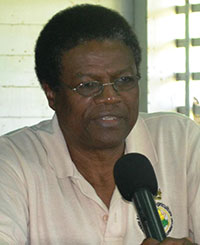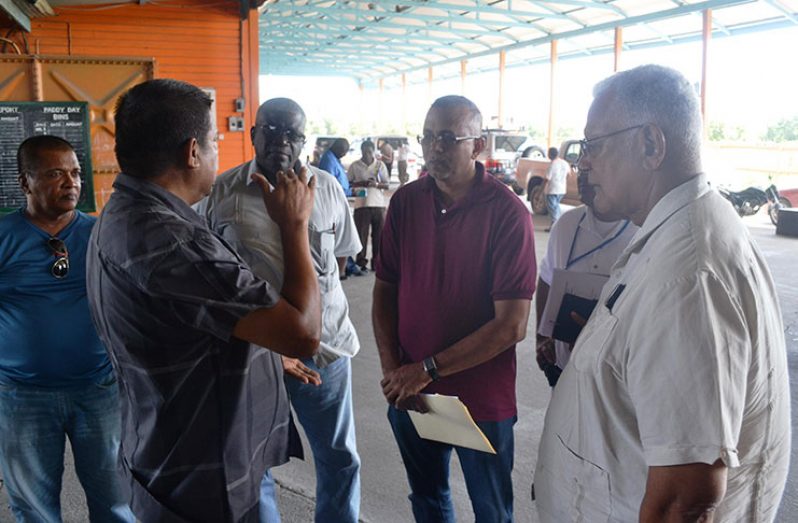–agri. minister urges during successful tour of Black Bush Polder
IT’S not just about having a green thumb anymore, but more about savvy and strategy, if you want to stay in this business called agriculture and turn a profit, says Agriculture Minister, Noel Holder.

“Oftentimes we have farmers complaining about not being able to sell their produce and suffering losses because of spoilage. Since taking office, I have been encouraging farmers to practise market-led agriculture; speak with us so we can advise you on what to plant, based on what markets are available,” Minister Holder said on Thursday.
“When you plant crops and there are no markets for them, they tend to spoil. Even processing some of these crops may not help if there isn’t a market for them in the processed form. I will, however, talk to my officers at the Guyana Marketing Corporation (GMC) on what markets are available, and how we can assist you with processing facilities for your surplus produce,” he told Berbice cash-crop farmer,
Phillip Sanchu, who had some concerns about the effects of climate change on farmers’ productivity, and cited the need for an agro-processing facility in the Ancient County to help farmers there with spoilage.
The occasion was an outreach the minister spearheaded to the Region Six (East Berbice-Corentyne) village of Black Bush Polder, where he and his team met with scores of rice, cattle and cash-crop farmers to assess what’s happening with agriculture in the region, and talk about plans for further development.
During the meeting, some farmers called for more land to be made available for cultivation to meet the current demand for rice, while others spoke about a few issues they’re having with irrigation.
THIS AND THAT
One such farmer was Lallbahadur Singh, who’s not just a member of the region’s Water Users Association, but also sits on the Neighbourhood Democratic Council and the Regional Democratic Council.
Said he: “I believe that the sluice is under-utilised, and that it can be more efficient and better serve Black Bush.
“I am also suggesting that the Water Users’ By-Laws be updated to better sanction farmers who are not paying their rates.
“The Water Users Association should also be able to take persons to court when they have not paid for their services.”
Electing to respond to those concerns that Singh raised, Chief Executive Officer of the National Drainage and Irrigation Authority, Fredrick Flatts, begged to differ on several counts.
“The sluice is working within the specified capacity to service the entire block,” he said, adding:
“If you are having issues with water, I urge you to contact your Water Users Association so that they can make representation to have measures put in place to better serve you. There are channels that you must go through if you are not satisfied with irrigation and drainage services. As it relates to taking persons to court, that is already being done; it was put into law, and the association has the right and the authority to take persons to court for unpaid service charges.”
That little matter apparently settled, farmers next turned their attention to aerial spraying, asking how they could access the service.
On this occasion, Minister Holder himself responded, saying that while he is all for technological advances, in his humble opinion, aerial spraying is not always the answer, as it can sometimes have a negative effect on some people.
“I am in full support of the use of new technology in agriculture; aerial spraying can be helpful to many farmers,” Minister Holder said.
“However, when applying pesticides and other chemicals, aerial spraying tends to affect different categories of farmers in different ways.
“For instance, aerial spraying to apply fertilisers may benefit several categories of farmers, but when applying chemicals like pesticides, one has to take into consideration the effects it would have on cash crops under cultivation, and persons residing in the surrounding areas as aerial drift tends to occur.”
That said, he, however, encouraged those farmers interested in aerial spraying to band themselves together and collectively approach an air service provider, since it’s a very costly exercise.
DAIRY FARMING
And while he had their full attention, Minister Holder brought up the subject of dairy farming, and plans the ministry has to resuscitate the industry.
As head of the Guyana Livestock Development Authority (GLDA), Nigel Cumberbatch elected to speak on the subject, telling farmers that while livestock in Guyana is progressing nicely, there is yet more work to be done.
“We are self-sufficient in most of our livestock products, however, our milk import bill is well in excess of US$55M per year,” Cumberbatch said, adding:
“It is our intention to establish a pasteurisation plant in the region, and we are going to be depending on you, the farmers, to have milk to supply it.”
At this point, Minister Holder called for the establishment and registering of a cattle association in Region Six.
“It is important for the association to become a reality,” he said, “as countries like Suriname have expressed an interest in purchasing cattle from us.
“We want to ensure that any sales are done in an organised manner, so as to ensure efficiency and accountability.”


.jpg)











